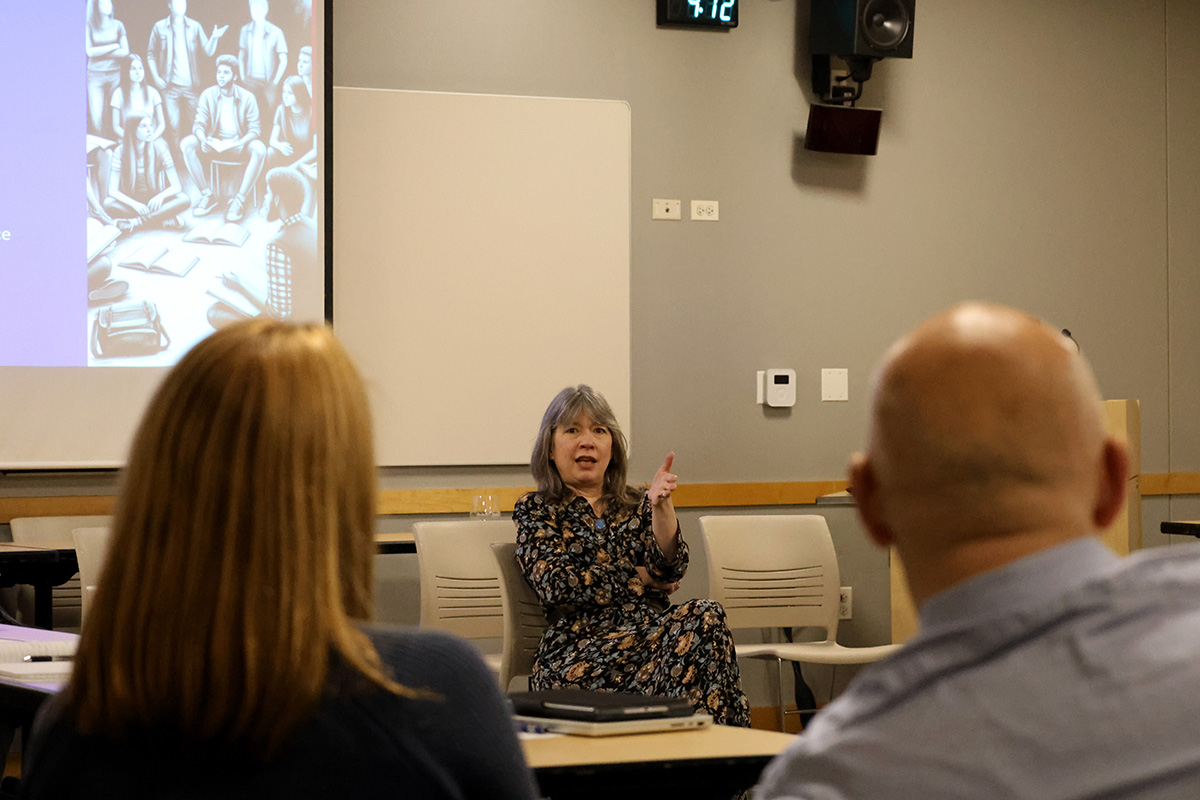
Twenty faculty and staff participated in the initial cohort of the Dialogue in Action training. DePaul faculty, staff and students are learning skills to navigate difficult topics in different venues across campus. (Will Robson/DePaul Student Photo Agency)
Across campus, faculty, staff and students are learning skills to navigate difficult topics, including learning different approaches to dialogue.
“Dialogue is any conversation in which the goal is to reach mutual understanding, not necessarily agreement. It is not a veiled form of debate,” says Elissa Foster, a professor in the College of Communication. Foster taught a Compassionate Communication class and was part of the fall cohort of the
Dialogue in Action training.
Two initiatives at DePaul are advancing the practice of dialogue at DePaul. Twenty faculty and staff participated in the initial cohort of the Dialogue in Action training. More than a dozen faculty and staff learned about interfaith dialogue and fostering religious pluralism in a BUILD Diversity session in November facilitated by the nonprofit Interfaith America. They are already beginning to apply their learnings in classrooms and events across campus.
For Peace, Justice and Conflict Studies student Alexa Huerta, finding community in her DePaul classes has been central to navigating the difficulties of life.
“The Compassionate Communication class taught me how to navigate communication by watching for what people really need,” says Huerta, who is now a senior. “Often in conflict, you both have a similar need. You’re just using a different strategy to get there. Understanding that has been helpful for me to be less eruptive and more patient in conflict.”
Facilitating dialogue
As the first cohort of the Dialogue Collaborative wrapped up, participants reflected on what they learned.
De-escalation of conflict can be one outcome of a dialogue, Foster says. But there are important building blocks to ensuring successful dialogue: building trust with participants, carefully framing the conversation and being conscious of bias to not “stack the deck” in favor of one side or another.
“Go slowly. Make sure that people are staying connected to feelings, thoughts and their own perspective,” Foster says.
The central role emotion can play in dialogue surprised Craig Klugman, a Vincent de Paul professor in the College of Science and Health who also completed the training. Part of the goal of these exchanges is to share and understand another person's experience and feelings.
"Some want to resolve conflict fast and think dialogue to be the quick answer, but it's a deliberative process," Klugman says. "We might not even get to an answer. We're just trying to access another human being's experience and feelings, and that's a really hard thing to do."
While dialogue can be an opportunity to air differences, it's also important to stay connected to our commonalities as well.
"We are all human beings who want to be respected and valued. We all care about the community we're a part of, and there are many more things that make us similar than things that tear us apart," Klugman says.
Fostering religious pluralism and connection across faiths
This fall, an event with
Interfaith America exemplified how communities can connect through dialogue.
DePaul has a history of interfaith cooperation, says Carr Harkrader, an Interfaith America program consultant, who led the training session for faculty and staff in the
BUILD Diversity certificate program. Interfaith America is a Chicago based nonprofit that aims to “unlock the potential of America’s religious diversity.”
“We’ve found in our work that an institution having some sort of religious background, such as DePaul’s Catholic affiliation, helps with interfaith work,” Harkrader says. “Understanding where the institution is coming from allows us to better engage students from all different backgrounds and create an environment where we’re Catholic, but we’re not exclusionary towards others.”
Interfaith America also provides programming and support for students. A grant from the organization to DePaul’s Mission and Ministry supports the creation of the
Bridgebuilding Fellowship. Launching in the winter quarter, between 40 and 50 student leaders will develop skills to cultivate connection and relationship building across different faiths, convictions, ideologies and more.
“Forming relationships is the best start to any type of action or dialogue. Something as simple as a Muslim student and a Christian student bonding in a calculus class can lead to something greater if they engage with each other beyond the surface level,” Harkrader says. “Thinking about what brings us together, even if we do have differences, is always a good start.”